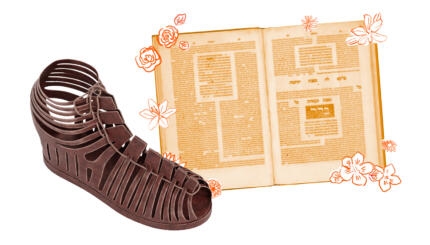Once upon a time, there were four brothers, two of whom married a pair of sisters. Before long, the brothers’ dreams of building a family ended suddenly when both died childless.
The two surviving brothers were not sure what to do. They each now had a levirate bond with each of the sisters obligating them to marry. At the same time, each of the sisters had become a sister of someone who had also fallen to each brother for yibbum. Men are not allowed to marry two sisters, and as we’ve seen previously in this tractate, the levirate bond is akin to a marriage in miniature, so each surviving brother was both obligated to and prohibited from marrying either of the sisters. They were not sure what to do.
Luckily, the mishnah on yesterday’s daf anticipated this exact situation. It’s ruling? Both sisters should perform halitzah, the ceremony to nullify the obligation of levirate marriage. Why? Halitzah acknowledges both the levirate obligation and the prohibition against marrying one’s wife’s sister. Performing the halitzah ritual allows them to both meet their obligations and avoid doing something prohibited.
So, they each did halitzah with one of the sisters and they all lived happily ever after, right? Well, not exactly. They still had to deal with their grief and find a way to move forward in a society torn between a biblical and prophetic tradition of supporting widows and an emerging legal tradition that made it difficult for women to survive economically without a husband.
With your help, My Jewish Learning can provide endless opportunities for learning, connection and discovery.
On today’s daf, Rabbi Yosei bar Hanina, who because of the era in which he lived may not have been mindful of these challenges, listened carefully to this story and then proceeded to offer a different solution:
Let one of the brothers perform halitzah with the sister whose husband died last. As a result, the first would subsequently become permitted to the brother who did not perform halitzah.
Rabbi Yosei’s suggestion makes sense. Halitzah severs the levirate bond, and by dissolving that bond with one sister, the prohibition against marrying the other is lifted. Another case on our today’s daf offers a precedent for this: Two sisters married two brothers who both died childless. The widows then fell to one surviving brother for levirate marriage. But before the brother could act, one of the sisters dies.
About this second case, Rabbi Yohanan ruled:
If the second sister (i.e., the one whose husband died second) dies, he is permitted to take the first in levirate marriage. But if the first sister dies, he is prohibited from taking the second sister.
What’s the logic here?
When the second sister fell to the surviving brother for levirate marriage, she was forbidden to him because she was the sister of a woman with whom he had a levirate bond. As such, she could never again be permitted to him.
The first sister also became forbidden to the surviving brother when her sister’s husband died, but this prohibition is temporary. Because she was initially permitted to the surviving brother when she became a yevama, she returns to her permitted status when her sister (the “cause” of the prohibition) dies.
So Rabbi Yosei argues that since the first sister’s status can be restored when the levirate bond is severed by her sister’s death in the second case, shouldn’t it do the same after halitzah is performed in the first story? In response, Rabbi Yochanan says:
Sisters? I do not know who taught about them in the mishnah.
Rabbi Yochanan responds that he doesn’t agree with what was taught in the mishnah. Rather than explaining why his solution for story two is not applicable to story one, or explaining why his solution works only for story two, he shrugs his shoulders and says, “I don’t hold by this mishnah.”
If his dismissal of the ruling in the mishnah alarms you, don’t worry. The Gemara has what to say about other ways that Rabbi Yohanan might have responded. You just have to wait until tomorrow’s daf to read about it.
Read all of Yevamot 27 on Sefaria.
This piece originally appeared in a My Jewish Learning Daf Yomi email newsletter sent on April 3rd, 2022. If you are interested in receiving the newsletter, sign up here.



